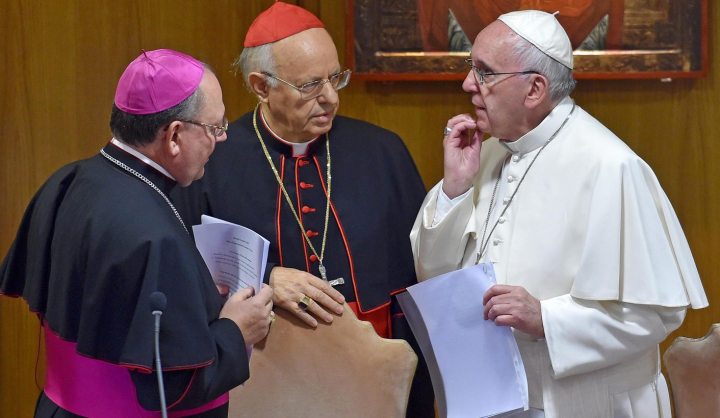Maverick Life, World
Synod on the Family: To unlock the church’s door, or not?

A large contingent of world media hovers in Rome waiting to hear about what emerges from the Synod on the Family. Last Sunday, a worldwide meeting of Catholic bishops, called by Pope Francis, began in Rome. Three South African bishops and a married couple are amongst the delegates. The first of three weeks, has now ended and although nothing has been decided, a number of divergent trajectories are emerging. By RUSSELL POLLITT.
Pope Francis has been present at all the plenary sessions of the Synod on the Family. He gave an introductory address to open the gathering and then made only one other remark. The delegates – which includes bishops and some lay people – from around the globe have given most of the input. The delegates also spent two days doing work in smaller language groups. After the first meeting of this synod, in October 2014, a document called Instrumentum Laboris was produced. This text is the foundation for this year’s discussion on the family.
In his introductory remarks Pope Francis said that the synod was “neither a convention, nor a parlor, nor a parliament or senate, where people make deals and reach compromises”. He said it was a gathering of the ecclesial community in which the church “interrogates herself with regard to her fidelity to the deposit of faith”. He asked the bishops who have gathered for the synod to be courageous, humble, confident, and trusting in prayer before God.
The pope only made one other intervention after his introduction. On the second day, before the morning session began, he said he wanted to “clarify” a few things. He told the assembly that this synod is to be seen as a continuation of last year’s extraordinary synod, that Catholic doctrine on marriage had never been called into question, and that the synod is not about one single issue. He referred specifically to the question of the reception of communion by divorced and remarried Catholics. Some analysts and media in Rome immediately said the pope was warning the assembled bishops not to succumb to “conspiracy theories” which seemed to be doing the rounds about the very nature and purpose of this gathering.
Before the meeting began, the pope changed some of the rules and the process for the synod. The bishops are, for example, doing much more talking in small language groups; there will be no interim document in this synod (last year the interim document caused a lot of friction because some bishops did not believe it was representative of their discussions and positions); and there will be no voting proposition by proposition at the conclusion of the synod. Everything will be recorded in one report and presented to the pope. There is also no clarity on the question of whether or not a document will be issued after the synod dealing with its content. The pope normally writes an Apostolic Exhortation after a synod, this time round he may not.
The change in process has caused some confusion to old hats at the synod – ways of proceeding have been ways of proceeding for a long time! But not everyone sees confusion about process a problem. Earlier this week Cardinal Luis Antonio Tagle of Manila in the Philippines humorously told the media at a Vatican media briefing that it was “good to be confused from time to time”. He explained that he thought the new process was effective because the bishops dealt with issues one at a time, as outlined in the working document, rather than having to listen to 300 interventions before sitting down to look at it. The president of the US Conference of Catholic Bishops, Archbishop Joseph E Kurtz, agreed with Tagle saying that it was now much easier to focus.
A few things have emerged in the first week of the gathering. This synod is universal in the sense that there are bishops, married couples and other participants present from all over the world. The inputs, focusing on family issues, have brought a diverse and complex set of issues to the table. The concerns, for example, of the church in North America, Africa and the Middle East have a number of common threads but are very different in nature. North Americans have spoken about how secularism and individualism have had a negative impact on family life. In the Middle East bishops say family life is being torn apart by war and, as one said, the desperate desire to flee the “hell” people are living in.
Africa is well represented at the synod. There is a married couple from South Africa as well as three South African bishops – Cardinal Wilfrid Napier of Durban, Bishop Zolile Mpambani of Kokstad and Archbishop Stephen Brislin of Cape Town. Napier was appointed as one of the president delegates of the synod.
Last week Napier said Africa was suffering from “ideological colonisation”. He said: “What we are talking about is when countries are told ‘unless you pass certain legislation, you are not going to get the aid from the government or the agencies that give aid. If you don’t have certain legislation on your books.’ I think (this) was said explicitly in Kenya by President (Barack) Obama.” He went on to say that the synod is discussing many issues that impact on the family in Africa including polygamy. Napier said migration was a concern for Africa. He also said Africa has always been told to control its population so that it does not “overrun” the world. The cardinal said that it was ironic that Europe was having “such a difficult decision to have to make as to what do they do in order to accommodate all the refugees that are coming from the Middle East at present”.
Archbishop Charles Palmer-Buckley, of Accra, Ghana, told the media that the world needs to be patient with Africa. “Give countries time to deal with issues from our own cultural perspectives,” he said (referring to homosexuality). He was critical of the west, saying that they never listen to Africa’s solutions to problems. He added that often “everything that’s good in Africa is not good enough for European media but anything that is bad is what’s good enough”.
A number of things have emerged in the first week of this meeting. These not only give a sense of where things are but also the difficult path the church has to navigate:
- Despite claims to the contrary, a number of the participants at the synod are divided on issues. There are those who believe in dialogue, outreach and a more welcoming approach. Others believe the church cannot change things because it does not have the power to change tradition. The church, they say, must uphold its teaching despite opposition. Some bishops really want to find the key and open the door of the church to the world, others want the door to be carefully controlled or, even, kept locked.
- The understanding of “family” is diverse, there is not only one kind of “model family” as some (not all) of the prelates seem to suggest.
- Different parts of the world have different concerns – gay marriage, for example, is a hot-button issue in North America, parts of Europe and Africa. In the Middle East daily survival in a war zone is what’s most important for many families.
- There is a huge amount of issues on the table; it will be impossible to give adequate attention to them all. These range from macro issues like political and economic situations, war, legislation, education, violence against women and inter-generational passing on of the faith to other, perhaps more “micro” issues, like polygamy and the way the church should respond in local contexts to local matters – like tax structures that favour family life in different countries.
One issue worth highlighting – which has recurred at this meeting – is migration. While there is consensus that this is a major threat to societies and family life all over the world – when people are forced to flee – there is not necessarily agreement on how this should be dealt with. Pope Francis made an appeal to Europe, for example, to welcome migrants – the Vatican has provided shelter for a Syrian family. Cardinal Baselios Cleemis Thottunkal from India, on the other hand, expressed another view. He believes the world community and leaders should make it possible for people to be accommodated and sustained in their own countries.
- The question of language has been spoken of many times. How will the bishops find a language that expresses, universally, what they want to say? Is there too much “church-speak” which makes what the church says inaccessible? There is also the question of the kind of language the church uses – does this need to be more sensitive and accommodating. Some bishops say the church cannot be “politically correct” because there are certain truths that have to be spoken in a forthright manner. Others say dignity and charity demand that new forms of expression are found.
- Then there are the hot-button issues: homosexuality, the admission of the divorced and remarried to communion and whether or not the church can have a more positive attitude to couples who cohabitate or those who are in cultural traditional marriages.
- The question of the decentralisation of power when it comes to dealing with local issues has been mentioned. Some would like to see power delegated to local contexts to decide on some issues, others are a little less enthusiastic about this.
- And the big question: how does the church better support and encourage family life today in the diverse and complex situations where the church is present all over the globe? Is there a universal “formula”?
It is a tall order and three weeks will not be enough to deal with all of these issues. The synod meets six days a week, morning and afternoon, for lengthy sessions but even these will not suffice.
At the end of it all Pope Francis will be presented with a report and he will have to decide on the way forward, taking into account everything he has heard in the three weeks and what report says. It won’t be an easy task. Then again, the pope recently managed to steer his way through a highly charged political and religious maze in the US, for the most part, successfully. He might well manage to do the same – this time in Rome. DM
Photo: Pope Francis (R), Cardinal Lorenzo Baldisseri (C) and Bishop Fabio Fabene (L) during a session of the two-week bishops’ meeting on family issues, at the Vatican, 06 October 2015. Nearly 300 cardinals, bishops and prelates from around the world were debating the controversial question of whether the Catholic Church should soften its stance towards divorcees and homosexuals. The summit that ends October 25 and is known as the synod, started 04 October with a mass in St Peter’s Cathedral. EPA/ETTORE FERRARI















 Become an Insider
Become an Insider